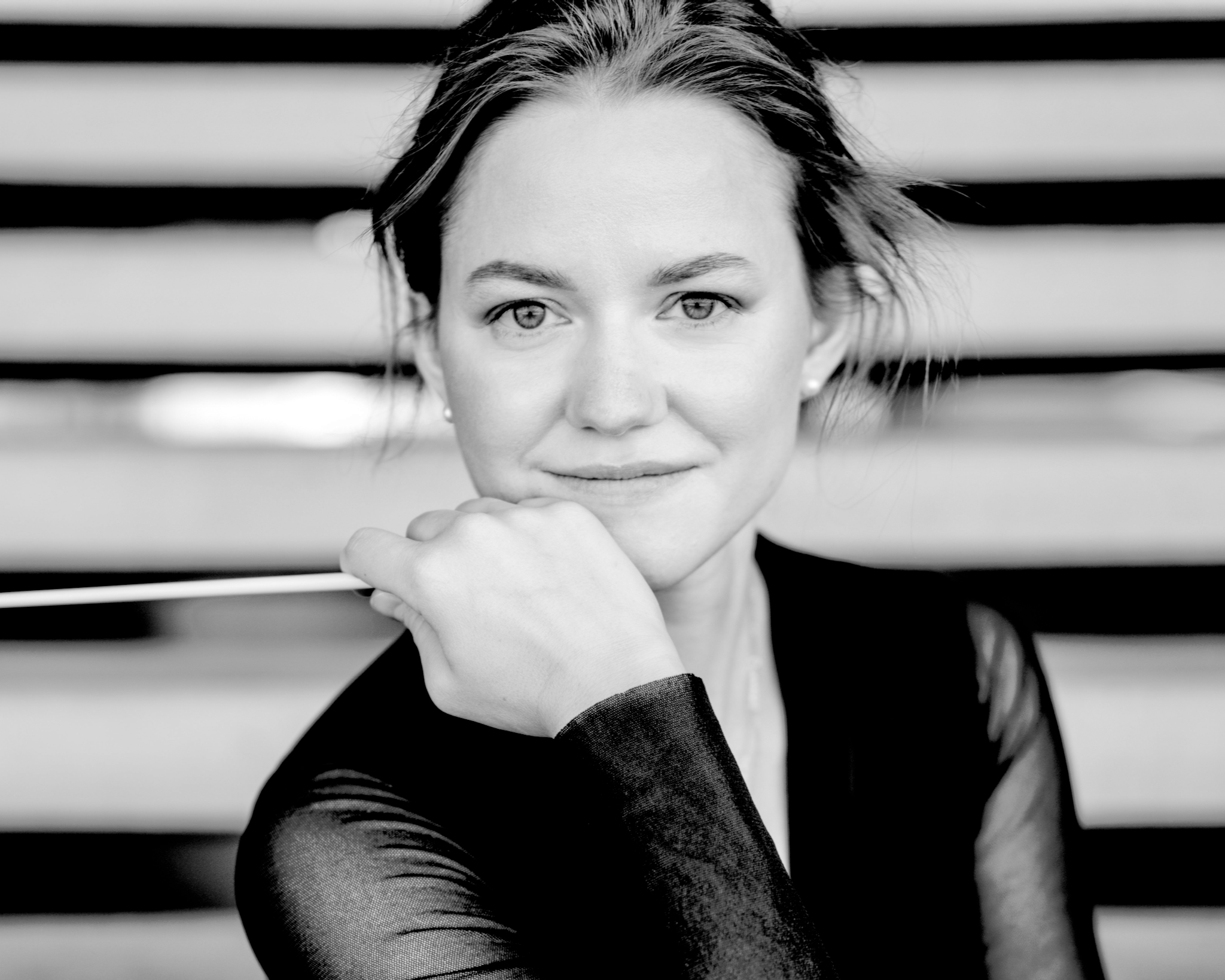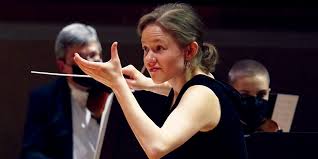People in the News
New Artist of the Month: Conductor Katharina Wincor
 “I grew up in a household that was very noisy—we had a lot of tiny violins; I guess you could say they were our toys.”
“I grew up in a household that was very noisy—we had a lot of tiny violins; I guess you could say they were our toys.”
Conductor Katharina Wincor (pronounced Winsor) is the youngest of four sisters, now all professional musicians, offspring of a father and mother who teach violin and voice, respectively, in Upper Austria. Having made her professional debut in 2019 at age 24, as the just-named assistant conductor of the Dallas Symphony Orchestra, she has come a very long way in a very short time. Four years' worth of training in six.
“I arrived in Dallas just before the pandemic struck,” she remembers. “At the time that I auditioned, in 2019, I was a full-time student in Zurich. I had experience with orchestras through school projects, master classes, and competitions, but my actual professional debut was with the Dallas Symphony when I was hired.”
That was within just months of her audition. Granted, she had received the Neeme Jarvi Conducting Prize at the Gstaad Menuhin Music Festival in 2017 and that same year was one of five young conductors chosen to study at Riccardo Muti’s Italian Opera Academy.
But that noisy household was her foundation. “I was free to choose whatever instrument I wanted so I started on violin in elementary school, then piano, although I wasn’t very diligent, and then oboe." Explorations in conducting began as a teenager with a group of singing friends (“we rehearsed our 15-minute program endlessly!") and continued in Vienna and at Zurich’s University of the Arts. Once fully versed in the academics of the craft, Dallas became her practicum.
“The time in Dallas was extremely educational,” she remembers in a Zoom call from Vienna. “On the one hand, I got to observe many different conductors work with the orchestra on a variety of repertoire. Plus, Fabio Luisi just started his relationship with the orchestra, so I could see how the collaboration between a music director and an orchestra grows over the first months and years.”
The DSO was also one of the first orchestras to return to live performances, with the musicians spaced widely onstage and the audience as well. In addition to serving as cover conductor and assisting Luisi and others, she was given ample podium time, about six weeks per season, “which is quite a lot when you are just starting,” she says. “They were usually very busy weeks, too, with several education concerts and run-outs. My second year in Dallas I also had the great opportunity to take over a subscription program when a conductor couldn't travel because of the pandemic. We did Mendelssohn's Violin Concerto with James Ehnes, and Schubert's Fifth Symphony, which is a special memory for me.”

It was special to the local critic as well. “Unlike too many young conductors these days, Wincor indulged in no gymnastics to impress the audience,” wrote Scott Cantrell in the Dallas Morning News. “No, her gestures told the orchestra how loudly or softly to play, where to point notes or pad them. She urged the music on, but always gave it shape and significance, with just the right room to stretch in just the right places.”
Wincor made her debuts with the Phoenix and Cincinnati symphonies, resulting in invitations to return, the latter in 2024 with Sheku Kanneh-Mason in Shostakovich’s Cello Concerto, No. 1. Elsewhere Stateside, she’s led the North Carolina, Vancouver, and Seattle symphonies, among others. This summer she makes her National Symphony Orchestra (NSO) debut at Wolf Trap.
Europe is home
But most of her work since Dallas has been overseas, in a tour of Germany with the SWR Stuttgart, of Austria with the Bruckner Orchestra Linz, and debuts with, among others, the Orchestre National de Toulouse, the Vienna Symphony, and the Salzburg Festival. Next year will see debuts with the Halle Orchestra, Radio Orchestra Frankfurt, the Bremer Philharmoniker and, in the U.S., the Charleston and Milwaukee symphonies.
Her repertorial choices are best described as eclectic. “Right now I’m very much exploring the symphonic repertoire and trying out a lot of different styles. I want to keep it that way because I know everyone gets put in a corner.”
She works frequently with the self-governed Ensemble Reflextor, which defines itself as “an ambassador of a musical culture without borders.” Last year she conducted the German group in the premiere of David Orlowsky’s Clarinet Concerto, Shadow Dancer, in the Grand Hall of the Elbphilharmonie. “We like to experiment; I always learn something from them,” she says. Another favorite new-music collaborator is Klangforum Wien, with which she appears this month at Amsterdam’s Muziekgebouw in a program of Schoenberg and Webern titled “Black Holes from the Romantic era.”
She is apparently fearless when it comes to new music; she is preparing Hans Werner Henze’s satirical chamber opera The English Cat for rehearsal with members of the Bayerische Young Opera studio next fall. The opera, which explores class division through the eyes of bourgeois cats who form the Royal Society for the Protection of Rats, is directed by Christiane Lutz (wife of Jonas Kaufman) and bows next season at the Staatsoper.
But she studiously avoids that "corner." If new music with young hip experimentalists is a favorite dwelling place, it is by no means the only one: The NSO debut program is all chestnuts: Dukas’s Sorcerer’s Apprentice, Gershwin’s Piano Concerto in F, with Jean-Yves Thibaudet, and Rimsky-Korsakov’s Scheherazade. Wincor says of this last, “It’s the perfect composition; it’s fun to play and the musicians love it because of all the solos. It showcases all of the talent in the orchestra.” Not without the right conductor and at the right time. Safe to say, Katharina Wincor is it, now.
Top photo © Andrej Grilc





 FEATURED JOBS
FEATURED JOBS

 RENT A PHOTO
RENT A PHOTO


